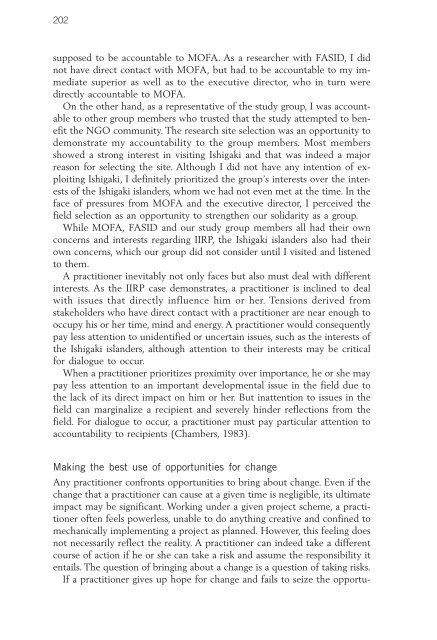Dialogue in Pursuit of Development - Are you looking for one of ...
Dialogue in Pursuit of Development - Are you looking for one of ...
Dialogue in Pursuit of Development - Are you looking for one of ...
Create successful ePaper yourself
Turn your PDF publications into a flip-book with our unique Google optimized e-Paper software.
202<br />
supposed to be accountable to MOFA. As a researcher with FASID, I did<br />
not have direct contact with MOFA, but had to be accountable to my immediate<br />
superior as well as to the executive director, who <strong>in</strong> turn were<br />
directly accountable to MOFA.<br />
On the other hand, as a representative <strong>of</strong> the study group, I was accountable<br />
to other group members who trusted that the study attempted to benefit<br />
the NGO community. The research site selection was an opportunity to<br />
demonstrate my accountability to the group members. Most members<br />
showed a strong <strong>in</strong>terest <strong>in</strong> visit<strong>in</strong>g Ishigaki and that was <strong>in</strong>deed a major<br />
reason <strong>for</strong> select<strong>in</strong>g the site. Although I did not have any <strong>in</strong>tention <strong>of</strong> exploit<strong>in</strong>g<br />
Ishigaki, I def<strong>in</strong>itely prioritized the group’s <strong>in</strong>terests over the <strong>in</strong>terests<br />
<strong>of</strong> the Ishigaki islanders, whom we had not even met at the time. In the<br />
face <strong>of</strong> pressures from MOFA and the executive director, I perceived the<br />
field selection as an opportunity to strengthen our solidarity as a group.<br />
While MOFA, FASID and our study group members all had their own<br />
concerns and <strong>in</strong>terests regard<strong>in</strong>g IIRP, the Ishigaki islanders also had their<br />
own concerns, which our group did not consider until I visited and listened<br />
to them.<br />
A practiti<strong>one</strong>r <strong>in</strong>evitably not only faces but also must deal with different<br />
<strong>in</strong>terests. As the IIRP case demonstrates, a practiti<strong>one</strong>r is <strong>in</strong>cl<strong>in</strong>ed to deal<br />
with issues that directly <strong>in</strong>fluence him or her. Tensions derived from<br />
stakeholders who have direct contact with a practiti<strong>one</strong>r are near enough to<br />
occupy his or her time, m<strong>in</strong>d and energy. A practiti<strong>one</strong>r would consequently<br />
pay less attention to unidentified or uncerta<strong>in</strong> issues, such as the <strong>in</strong>terests <strong>of</strong><br />
the Ishigaki islanders, although attention to their <strong>in</strong>terests may be critical<br />
<strong>for</strong> dialogue to occur.<br />
When a practiti<strong>one</strong>r prioritizes proximity over importance, he or she may<br />
pay less attention to an important developmental issue <strong>in</strong> the field due to<br />
the lack <strong>of</strong> its direct impact on him or her. But <strong>in</strong>attention to issues <strong>in</strong> the<br />
field can marg<strong>in</strong>alize a recipient and severely h<strong>in</strong>der reflections from the<br />
field. For dialogue to occur, a practiti<strong>one</strong>r must pay particular attention to<br />
accountability to recipients (Chambers, 1983).<br />
Mak<strong>in</strong>g the best use <strong>of</strong> opportunities <strong>for</strong> change<br />
Any practiti<strong>one</strong>r confronts opportunities to br<strong>in</strong>g about change. Even if the<br />
change that a practiti<strong>one</strong>r can cause at a given time is negligible, its ultimate<br />
impact may be significant. Work<strong>in</strong>g under a given project scheme, a practiti<strong>one</strong>r<br />
<strong>of</strong>ten feels powerless, unable to do anyth<strong>in</strong>g creative and conf<strong>in</strong>ed to<br />
mechanically implement<strong>in</strong>g a project as planned. However, this feel<strong>in</strong>g does<br />
not necessarily reflect the reality. A practiti<strong>one</strong>r can <strong>in</strong>deed take a different<br />
course <strong>of</strong> action if he or she can take a risk and assume the responsibility it<br />
entails. The question <strong>of</strong> br<strong>in</strong>g<strong>in</strong>g about a change is a question <strong>of</strong> tak<strong>in</strong>g risks.<br />
If a practiti<strong>one</strong>r gives up hope <strong>for</strong> change and fails to seize the opportu-

















![CynefinFramework final [Read-Only]](https://img.yumpu.com/19017304/1/190x135/cynefinframework-final-read-only.jpg?quality=85)